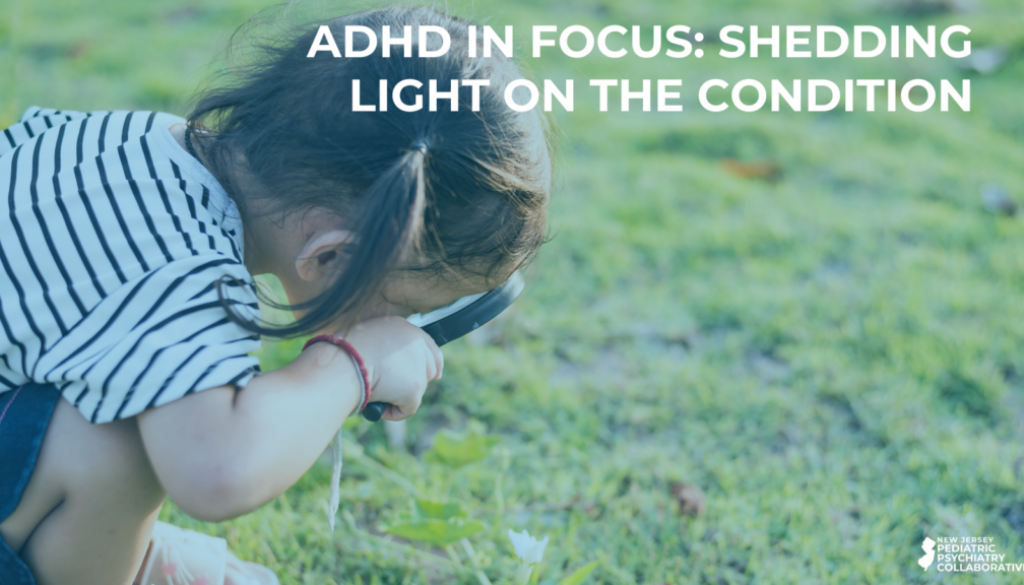ADHD in Focus: Shedding Light on the Condition
By Amy De Silva, MD
It is quite normal to notice children behaving in a more energetic, hyper, and less attentive manner than adults. Parents may notice certain behaviors like difficulty paying attention to rules or finishing homework on time to be a problematic issue. Other parents may be quick to label these behaviors as “normal”. It is important to tell the difference between developmentally appropriate behaviors and behaviors that may require additional evaluation1.
Have you ever noticed times when your child is just having a tough time paying attention to you, or they’re super hyperactive where you’re suspecting a sugar rush? There are a certain cluster of behaviors like inattention, difficulty concentrating, hyperactivity, and impulsivity that can lead to difficulty functioning throughout the day. If you notice your child is struggling with these behaviors either at home, school, or a friend’s home, and it’s causing them a great deal of distress, then it might be time for you to pay closer attention to their behaviors. Some behaviors may become so severe as to impair a child’s adjustment to their environment, that waiting for the child to “outgrow” such behaviors may not be the best approach1.
It is ok if you are wondering what to do next and are unsure what is going on with your child. We will discuss a condition known as attention deficit hyperactivity disorder (ADHD), which may or may not contain behavioral symptoms that your child is experiencing, and explore ways that you can find the appropriate help and guidance for yourself and your child. Please be aware that this does not substitute a full evaluation that should be done by a psychiatrist or qualified provider.
ADHD is a very common neurodevelopmental disorder that occurs in 3-5% of school-age children2. It usually starts around childhood. ADHD shows up in different ways. Some children have trouble paying attention, while others might be fidgety or hyper. Some experience a mix of these symptoms. While it can feel overwhelming to deal with these challenges, the first step is to understand what ADHD really is. This knowledge can help you provide support to your child as well as yourself. In this article, we’ll look at what ADHD is, how it gets diagnosed, and what treatment options are available.
The etiology of ADHD is still not very well known, however, there are many scientific thoughts as to what causes ADHD. Some scientists think that ADHD can be hereditary, similar to how you inherit your hair color from either parent. Other studies mention environmental risks that a mom might have been exposed to during pregnancy and after the baby is born, which include maternal cigarette smoking, drinking alcohol, maternal stress, low birth weight of newborn, and prematurity3. Some studies suggest that certain structural changes in the brain that control impulse, attention, and executive functioning can lead to ADHD. At the end of the day, it is important to recognize ADHD as a medical condition, rather than solely a result of parenting or behavior. This helps parents not to blame themselves but instead focus their attention on getting help and support.
If you feel that your child may show signs of ADHD, it is important to consult with a medical professional. Your pediatric care provider or a child and adolescent psychiatrist can provide an initial assessment which includes comprehensive interviews of your child, yourself, and teachers in the school setting. If your child is diagnosed with ADHD, your healthcare provider will provide a list of treatment options which may or may not include medication, therapy for you and your child, as well as school-based interventions which will include collaboration with teachers, and school administration in helping to coordinate appropriate and individual support for your child, otherwise known as individual educational program, or 504 plan.
Early involvement in identifying and treating your child with ADHD, can help set your child up for emotional and academic success in the future. It is important not to forget about your mental well-being in the process! Caring for children with ADHD can lead parents to put their own mental and physical health on the back burner, but it is important to provide yourself with support when needed! You can connect with local support groups for parents of children with ADHD or online support groups by searching for national ADHD support and advocacy organizations. Caring for a child with ADHD requires emotional resilience, but with the proper treatment and support, the symptoms can be controlled successfully!
Author Profile:


Amy De Silva, MD
Child & Adolescent Psychiatric Fellow
Trustee-at-Large, New Jersey Psychiatric Association
1 Barkley, R. A. (2020). Taking charge of ADHD: The complete, authoritative guide for parents. Guilford Publications.
2 Aacap. (2018, March). Attention-Deficit Hyperactivity Disorder (ADHD). Attention-deficit hyperactivity disorder (ADHD). https://www.aacap.org/AACAP/Families_and_Youth/Facts_for_Families/FFF-Guide/Children-Who-Cant-Pay-Attention-Attention-Deficit-Hyperactivity-Disorder-006.aspx
3 Thapar, A., Cooper, M., Eyre, O., & Langley, K. (2013). Practitioner review: what have we learnt about the causes of ADHD?. Journal of Child Psychology and Psychiatry, 54(1), 3-16.




